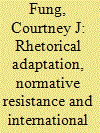| Srl | Item |
| 1 |
ID:
156162


|
|
|
|
|
| Summary/Abstract |
Scholarship on states’ responses to international norms has focused on commitment, compliance, and noncompliance; paying insufficient attention to responses that fall outside these categories. Beyond simply complying with or violating a norm; states contest, resist, and respond to international norms in a range of ways. I identify rhetorical adaptation as a central form of resistance to international norms. Rather than simply rejecting a norm or charges of norm violation, such a strategy draws on a norm’s content to resist pressures for compliance or minimize perceptions of violation. Theorizing the relationship between norms’ content and states’ resistant rhetoric, I identify four types of rhetorical adaptation: norm disregard, norm avoidance, norm interpretation, and norm signaling. To probe the plausibility of these propositions, a case study of Turkey’s post-World War II narrative of the Armenian Genocide traces a sequence of rhetorical adaptations over the past six decades. Building on the case study, I then draw out generalizable insights into the uses and effects of rhetorical adaptation. Connecting theoretical concerns in political science with the interdisciplinary fields of genocide studies and memory studies, I delineate the ways in which actors instrumentally use norms and expand understandings of the forms and effects of so-called norm takers’ agency.
|
|
|
|
|
|
|
|
|
|
|
|
|
|
|
|
| 2 |
ID:
173741


|
|
|
|
|
| Summary/Abstract |
How do rising powers execute normative resistance to shape international order? Contrary to the existing literature, I argue that rising powers are productive agents of normative change and international order-making, through the use of rhetorical adaptation to contest pre-existing orders. Rhetorical adaptation is a strategy and set of tactics that simultaneously modifies norm content, while reducing critiques of obstructionism. To make this argument, this article traces China’s efforts as a ‘norm shaper’ regarding the responsibility to protect through the inception, institutionalization and implementation of the norm in the landmark 2011 Libya intervention. China layers traditional sovereignty norms under the responsibility to protect, focusing and narrowing the emerging norm by fortifying the primacy of the state. While I show how China resists co-option into an evolving ontological order that challenges traditional sovereignty, the article also addresses the unforeseen consequences of China’s normative efforts that ‘backfired’ to permit the use of the responsibility to protect to justify Libyan regime change. More broadly, this article speaks to rising powers as agents crafting international order, and the process of normative resistance that occurs throughout the norm life cycle. I draw from publicly available documents and semi-structured interviews with Chinese foreign policy and United Nations elites.
|
|
|
|
|
|
|
|
|
|
|
|
|
|
|
|